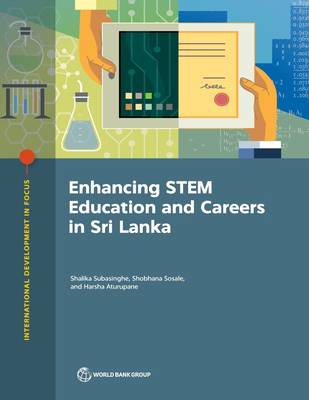
Bedankt voor het vertrouwen het afgelopen jaar! Om jou te bedanken bieden we GRATIS verzending (in België) aan op alles gedurende de hele maand januari.
- Afhalen na 1 uur in een winkel met voorraad
- In januari gratis thuislevering in België
- Ruim aanbod met 7 miljoen producten
Bedankt voor het vertrouwen het afgelopen jaar! Om jou te bedanken bieden we GRATIS verzending (in België) aan op alles gedurende de hele maand januari.
- Afhalen na 1 uur in een winkel met voorraad
- In januari gratis thuislevering in België
- Ruim aanbod met 7 miljoen producten
Zoeken
Enhancing Stem Education and Careers in Sri Lanka
Shalika Subasinghe, Shobhana Sosale, Harsha Aturupane
€ 51,95
+ 103 punten
Omschrijving
In recent decades, the Sri Lankan government has introduced reforms aimed at enhancing education access and quality, as well as emphasizing the importance of science, technology, engineering, and mathematics (STEM), which are crucial fields for economic development and social inclusion. Advancing STEM Education and Careers in Sri Lanka examines how access to STEM education can affect enrollments at various levels (lower, upper secondary, higher education, and technical and vocational training) and careers in the labor market. The report also analyzes STEM education status by gender at the central, provincial, and district levels, and it highlights factors that enable and hinder the achievement of desired outcomes.The report offers a wide range of interventions to boost student access and teacher training, including developing digital learning materials and technology-based tools to broaden service delivery, facilitate learning, and support an inclusive public education system. In addition, it proposes policy options at the central and provincial levels. The findings and recommendations can be used to guide policy and investments to achieve the country's potential to expand human capital, foster inclusion, contribute to economic development and competitiveness, promote recovery from the economic crisis, and build resilience.
Specificaties
Betrokkenen
- Auteur(s):
- Uitgeverij:
Inhoud
- Aantal bladzijden:
- 72
- Taal:
- Engels
- Reeks:
Eigenschappen
- Productcode (EAN):
- 9781464820045
- Verschijningsdatum:
- 15/08/2023
- Uitvoering:
- Paperback
- Formaat:
- Trade paperback (VS)
- Afmetingen:
- 216 mm x 279 mm
- Gewicht:
- 254 g

Alleen bij Standaard Boekhandel
+ 103 punten op je klantenkaart van Standaard Boekhandel
Beoordelingen
We publiceren alleen reviews die voldoen aan de voorwaarden voor reviews. Bekijk onze voorwaarden voor reviews.









